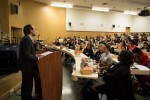A former United Nations High Commissioner for Human Rights said he thinks the UN needs to stand up to governments that allow racial injustice and inequality to exist at an event Friday.
Prince Zeid Ra’ad Al Hussein of Jordan reflected on the future of racial justice and equality as the keynote speaker at the Critical Perspectives on Race and Human Rights conference. The conference, hosted at the UCLA School of Law, was organized by the Promise Institute for Human Rights, the Critical Race Studies program and the Journal of International Law and Foreign Affairs.
E. Tendayi Achiume, an assistant law professor and UN special rapporteur who helped organized the event, said the programs organized a joint conference this year to address racial injustice and inequality through a human rights perspective because they think recent issues regarding racism and xenophobia have been particularly intense.
“We thought it was an important time to understand what value there is and what value there can be in using a human rights frame to fight for racial justice and to fight for racial equality,” Achiume said.
She said the conference aimed to offer multiple perspectives on these issues and promote collaborative efforts to resolve them.
“Our goal is to bring people who are working nationally within the U.S. and also people who are working in other parts of the world to come together and really think about what value there is in human rights in a way to reimagine how law and legal institutions can advance racial justice and racial equality,” Achiume said.
In his speech, Al Hussein said he thinks the UN’s effectiveness in addressing human rights injustices depends on its members’ efforts.
“The UN is just as pathetic or just as great as the world is out there,” Al Hussein said.
He added he is deeply alarmed by how several government leaders have remained silent about issues regarding racial injustice and equality. He said many of the chief executives of over 37 countries he visited as high commissioner were not aware of violence occurring in various communities around the world.
He said if the UN is to be more effective, it must discourage nationalism and encourage collaboration among its member nations.
“It is a collective effort to solve problems together and if we are going to turn the world around and fight racial injustice we must have numbers and show political power,” he said.
Al Hussein said international institutions should start enforcing human rights policies, rather than simply raising awareness of them.
“We need to move away from highlighting and expressing human rights, and use agitation to enforce human rights,” he said. “We need to oppose all those who degrade us as human beings and fight against them.”
He said he thinks people should take action against human rights issues without fear of criticism, instead of simply learning and writing about them.
“People full of integrity, empathy and courage are found in so many countries – those people need to be our leaders,” he said. “They are the hope and the future to the success of the UN, not the self-seeking, self-serving people.”
Achiume said Al Hussein spoke openly against racism and xenophobia when he was high commissioner and that he would specifically name countries, presidents and leaders who he believed were engaging in racist and xenophobic practices.
“He spoke very openly against racism and xenophobia, and sometimes experienced backlash from powerful countries that had racist and xenophobic people at the top,” Achiume said.
Curtis Harris, a graduate student in law, said the conference gave him the opportunity to learn more about human rights from more accomplished law practitioners, students and activists.
“The conference provided a very incredible framework to further explore issues on racial inequality and injustice,” Harris said.
Al Hussein said he thinks future world leaders should not be afraid to dedicate themselves to the fight for human rights in order for the world to make progress in this area.
“The thing that separates talent from young people and leaders is fear,” Al Hussein said.
